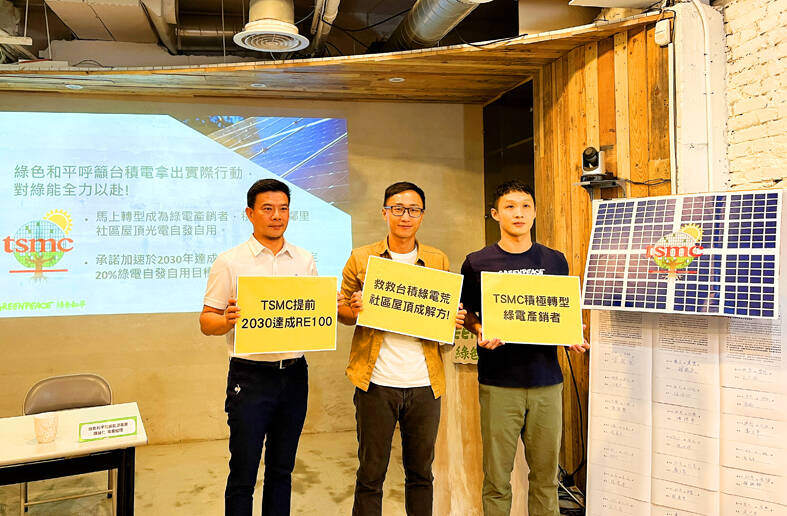Greenpeace yesterday urged semiconductor companies to further embrace solar energy, citing a survey that found nearly half of respondents living near where Taiwan Semiconductor Manufacturing Co (TSMC) has or plans to establish operations would be willing to lease their roofs for solar panels.
Forty-six percent of respondents in Tainan, Kaohsiung, and Hsinchu city and county who said they would be willing to rent out roof space for solar panels, Greenpeace Climate and Energy Project manager Chen Yung-jen (陳詠仁) said, citing a survey conducted by the charity in May.
Nearly 70 percent of respondents said that chipmakers should do more to increase the amount of solar energy produced, Chen added.

Photo: Chen Chia-yi, Taipei Times
Twenty-five village leaders from administrative regions around the Central Taiwan Science Park (中部科學園區) — where some TSMC fabs are based — said that they would be willing to lead an effort to persuade the semiconductor firm to help fund the installation of rooftop solar equipment in the area, he said.
The combined area of rooftops available for solar panels exceeds 900 hectares, about 444 times the size of Taipei Arena, Greenpeace said.
If used, they provide solar panel capacity of up to 900 megawatts, generating about 1,000 gigawatt-hours of renewable electricity annually, he said.
Chen said that if TSMC fully utilizes this capacity, its renewable energy use could increase to 15 percent of its total, up from the 10.4 percent reported in the chipmaker’s sustainability report last year.
Greenpeace has launched an online petition to ask village leaders across Taiwan to persuade residents to lease their unused rooftops for TSMC’s solar equipment installation, he said.
The petition data would be provided to TSMC for reference, the Greenpeace Web site says.
“The idea is not to single out TSMC, but to urge all semiconductor firms to increase solar energy use. Hopefully, TSMC, as the most well-known company, can act as the industry leader,” Chen said.
Taiwan Photovoltaic Industry Association executive director Chen Kun-hong (陳坤宏) said that numerous photovoltaic firms have already begun collaborating with local administrative units to develop community rooftop solar projects.
John Yang (楊仲傑), village warden of Tanyang in Taichung, said that residents strongly support Taiwan’s renewable energy development and efforts to provide renewable energy to TSMC.
However, he said that some residents would consider factors such as risk, construction quality and maintenance when deciding whether to allow the installation of solar panels on their rooftops.
Yang also said that if TSMC can hold face-to-face meetings to discuss these matters, it would reassure many Tanyang residents, and would aligns with TSMC’s social obligations as a major corporation.
TSMC joined the RE100 initiative in 2020, committing to achieve 100 percent renewable energy usage by 2050.

Taipei has once again made it to the top 100 in Oxford Economics’ Global Cities Index 2025 report, moving up five places from last year to 60. The annual index, which was published last month, evaluated 1,000 of the most populated metropolises based on five indices — economics, human capital, quality of life, environment and governance. New York maintained its top spot this year, placing first in the economics index thanks to the strength of its vibrant financial industry and economic stability. Taipei ranked 263rd in economics, 44th in human capital, 15th in quality of life, 284th for environment and 75th in governance,

The Sports Administration yesterday demanded an apology from the national table tennis association for barring 17-year-old Yeh Yi-tian (葉伊恬) from competing in the upcoming World Table Tennis (WTT) United States Smash tournament in Las Vegas this July. The sports agency said in a statement that the Chinese Taipei Table Tennis Association (CTTTA) must explain to the public why it withdrew Yeh from the WTT tournament in Las Vegas. The sports agency said it contacted the association to express its disapproval of the decision-making process after receiving a complaint from Yeh’s coach, Chuang

Control Yuan Secretary-General Lee Chun-yi (李俊俋) tendered his resignation last night, admitting that he had misused a government vehicle, as reported by media. His resignation was immediately accepted by the Control Yuan. In a statement explaining why he had resigned, Lee apologized for using a Control Yuan vehicle to transport his dog to a pet grooming salon on May 20. The issue first came to light late last month, when TVBS News reported that Lee had instructed his driver to take the dog to the salon. The news channel broadcast photos that it said were taken by an unnamed whistle-blower, which purportedly showed the

A former officer in China’s People’s Liberation Army (PLA) who witnessed the aftermath of the 1989 Tiananmen Square massacre has warned that Taiwan could face a similar fate if China attempts to unify the country by force. Li Xiaoming (李曉明), who was deployed to Beijing as a junior officer during the crackdown, said Taiwanese people should study the massacre carefully, because it offers a glimpse of what Beijing is willing to do to suppress dissent. “What happened in Tiananmen Square could happen in Taiwan too,” Li told CNA in a May 22 interview, ahead of the massacre’s 36th anniversary. “If Taiwanese students or